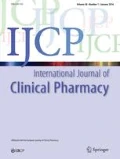Abstract
Background Prescribing errors are common in hospital inpatients. However, the literature suggests that doctors are often unaware of their errors as they are not always informed of them. It has been suggested that providing more feedback to prescribers may reduce subsequent error rates. Only few studies have investigated the views of prescribers towards receiving such feedback, or the views of hospital pharmacists as potential feedback providers. Objectives Our aim was to explore the views of junior doctors and hospital pharmacists regarding feedback on individual doctors’ prescribing errors. Objectives were to determine how feedback was currently provided and any associated problems, to explore views on other approaches to feedback, and to make recommendations for designing suitable feedback systems. Setting A large London NHS hospital trust. Methods To explore views on current and possible feedback mechanisms, self-administered questionnaires were given to all junior doctors and pharmacists, combining both 5-point Likert scale statements and open-ended questions. Main outcome measures Agreement scores for statements regarding perceived prescribing error rates, opinions on feedback, barriers to feedback, and preferences for future practice. Results Response rates were 49 % (37/75) for junior doctors and 57 % (57/100) for pharmacists. In general, doctors did not feel threatened by feedback on their prescribing errors. They felt that feedback currently provided was constructive but often irregular and insufficient. Most pharmacists provided feedback in various ways; however some did not or were inconsistent. They were willing to provide more feedback, but did not feel it was always effective or feasible due to barriers such as communication problems and time constraints. Both professional groups preferred individual feedback with additional regular generic feedback on common or serious errors. Conclusion Feedback on prescribing errors was valued and acceptable to both professional groups. From the results, several suggested methods of providing feedback on prescribing errors emerged. Addressing barriers such as the identification of individual prescribers would facilitate feedback in practice. Research investigating whether or not feedback reduces the subsequent error rate is now needed.
References
Dornan T, Ashcroft D, Heathfield H, Lewis P, Miles J, Taylor D, et al. An in depth investigation into causes of prescribing errors by foundation trainees in relation to their medical education. EQUIP study. London: General Medical Council; December 2009. Available at http://www.gmc-uk.org/FINAL_Report_prevalence_and_causes_of_prescribing_errors.pdf_28935150.pdf Date last Accessed 26 Sept 2012.
Lewis PJ, Dornan T, Taylor D, Tully MP, Wass V, Ashcroft DM. Prevalence, incidence and nature of prescribing errors in hospital inpatients: a systematic review. Drug Saf. 2009;32(5):379–89.
Franklin BD, O’Grady K, Paschalides C, Utley M, Gallivan S, Jacklin A, et al. Providing feedback to hospital doctors about prescribing errors; a pilot study. Pharm World Sci. 2007;29(3):213–20.
Dean B, Schachter M, Vincent C, Barber N. Causes of prescribing errors in hospital inpatients: a prospective study. Lancet. 2002;359(9315):1373–8.
Velo GP, Minuz P. Medication errors: prescribing faults and prescription errors. Br J Clin Pharmacol. 2009;67(6):624–8.
Dean B. Learning from prescribing errors. Qual Saf Health Care. 2002;11(3):258–60.
Franklin BD, Reynolds M, Shebl NA, Burnett S, Jacklin A. Prescribing errors in hospital inpatients: a three-centre study of their prevalence, types and causes. Postgrad Med J. 2011;87(1033):739–45.
Barber N, Rawlins M, Dean Franklin B. Reducing prescribing error: competence, control, and culture. Qual Saf Health Care. 2003;12(Suppl 1):i29–32.
Thomas AN, Boxall EM, Laha SK, Day AJ, Grundy D. An educational and audit tool to reduce prescribing error in intensive care. Qual Saf Health Care. 2008;17(5):360–3.
Chan AH, Garratt E, Lawrence B, Turnbull N, Pratapsingh P, Black PN. Effect of education on the recording of medicines on admission to hospital. J Gen Intern Med. 2010;25(6):537–42.
Brock TP, Franklin BD. Differences in pharmacy terminology and practice between the United Kingdom and the United States. Am J Health Syst Pharm. 2007;64(14):1541–6.
Hysong SJ, Best RG, Pugh JA. Audit and feedback and clinical practice guideline adherence: making feedback actionable. Implement Sci. 2006;1:9.
The Health Foundation. Evidence: how safe are clinical systems? Primary research into the reliability of systems within seven NHS organisations. London, May 2011. Available at http://www.health.org.uk/public/cms/75/76/313/587/How%20safe%20are%20clinical%20systems%20full%20length%20publication.pdf?realName=OaJgi3.pdf Date last Accessed 26 Sept 2012.
Forsetlund L, Bjorndal A, Rashidian A, Jamtvedt G, O’Brien MA, Wolf F, et al. Continuing education meetings and workshops: effects on professional practice and health care outcomes. Cochrane Database Syst Rev. 2009; 2: CD003030.
Farmer AP, Legare F, Turcot L, Grimshaw J, Harvey E, McGowan JL, et al. Printed educational materials: effects on professional practice and health care outcomes. Cochrane Database Syst Rev. 2008; 3: CD004398.
Kroll L, Singleton A, Collier J, Rees Jones I. Learning not to take it seriously: junior doctors’ accounts of error. Med Educ. 2008;42(10):982–90.
Department of Health Expert Group (Chaired by the Chief Medical Officer). An organisation with a memory. Report of an expert group on learning from adverse events in the NHS. London: The Stationery Office; 2000. Available at http://www.dh.gov.uk/en/Publicationsandstatistics/Publications/PublicationsPolicyAndGuidance/DH_4065083 Date last Accessed 26 Sept 2012.
Caldwell G. Real time “check and correct” of drug charts on ward rounds—a process for improving doctors’ habits in inpatient prescribing. Pharm Manage. 2010;26(4):3–9.
Funding
The Centre for Medication Safety and Service Quality, and the Centre for Infection Prevention and Management are affiliated with the Centre for Patient Safety and Service Quality at Imperial College Healthcare NHS Trust which is funded by the National Institute of Health Research.
Conflicts of interest
None.
Author information
Authors and Affiliations
Corresponding author
Electronic supplementary material
Below is the link to the electronic supplementary material.
Appendix 1: Doctors’ questionnare
(DOC 61 kb)
Rights and permissions
About this article
Cite this article
Bertels, J., Almoudaris, A.M., Cortoos, PJ. et al. Feedback on prescribing errors to junior doctors: exploring views, problems and preferred methods. Int J Clin Pharm 35, 332–338 (2013). https://doi.org/10.1007/s11096-013-9759-y
Received:
Accepted:
Published:
Issue Date:
DOI: https://doi.org/10.1007/s11096-013-9759-y

